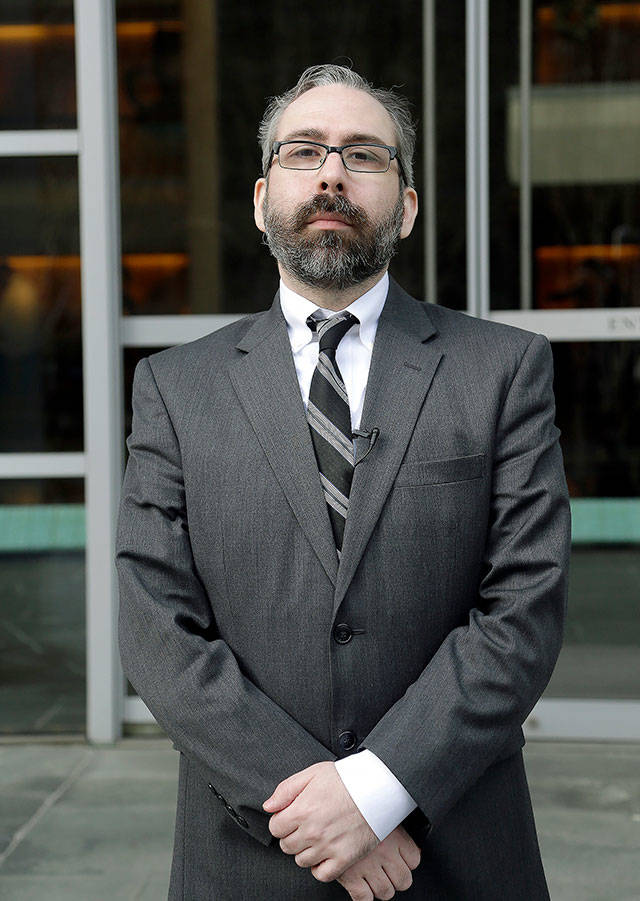EVERETT — The U.S. Supreme Court will hear arguments Wednesday in the case of an Everett man and two others who contend presidential electors can, under the Constitution, back the candidate of their choice rather than the one who wins the state’s popular vote.
Bret Chiafalo was one of the “faithless” Washington electors fined $1,000 by the secretary of state for not keeping his pledge to back Democratic candidate Hillary Clinton in 2016.
Chiafalo, Esther John of Seattle and Levi Guerra of Warden fought their fines, contending the civil penalty infringed on their constitutional rights to free speech, which allowed them to vote their conscience as members of the Electoral College.
“At the end of the day we were trying to put country ahead of party,” Chiafalo said Monday. “We were exercising the responsibility given to us by the Constitution.”
A year ago, in an 8-1 decision, the state Supreme Court upheld the fines, concluding the state is empowered under the U.S. Constitution not only to draw up the rules for electors but also to determine how to enforce them.
Chiafolo and his co-defendants seek a reversal of that ruling.
At issue is the extent of a state’s power to enforce how a presidential elector casts his or her ballot.
If justices side with faithless electors, it could inject a degree of havoc and uncertainty when the Electoral College convenes in December to formally select the next president. And it could energize a movement that wants to require that U.S. presidents be elected based on results of the popular vote nationally, not ballots cast by the 538 state-appointed members of the Electoral College.
Chiafalo, Guerra and John signed pledges to cast their votes for the party’s nominee, Clinton, if she won the popular vote in Washington, which she did. In Washington, Clinton received about 521,000 more votes than Donald Trump. Nationally, she received about 2.8 million more votes.
But they didn’t keep their word, backing former U.S. Secretary of State Colin Powell, a Republican they considered a better choice than Trump.
What they did wasn’t a surprise. Chiafalo helped found Hamilton Electors, which at the time was conducting a national campaign to derail Trump’s presidency by getting electors of both parties to break their pledges and vote for a different Republican to be the nation’s leader. If they could deny Trump a majority, the U.S. House of Representative would choose the president.
The plan failed. Ten electors did vote for someone other than Clinton or Trump, and, according to The Washington Post, five presidential elections have been decided by smaller margins. The most recent occurred in 2000, when President George W. Bush defeated Democrat Al Gore by five electoral votes.
Washington fined its faithless electors, while Colorado compelled its three rogue electors to cast their ballots for Clinton, the winner of that state’s popular vote. Those electors sued, arguing it was unconstitutional to force them to vote for Clinton. Their case is also getting heard Wednesday.
Attorneys for all six electors argue that while states can set rules for appointing electors, the Constitution conveys upon electors “the power ‘to vote’ free of state control.”
If a state had such power, it could forbid electors from voting for candidates who don’t release their tax returns or fail to take a particular position deemed important by legislators, they argue. But the Constitution denies such power to the states, they contend.
“Our forebears were not chumps,” they wrote in a May 1 brief.
Accepting electors’ argument that the state’s power ends when an elector is appointed opens the door to “bizarre and dangerous consequences,” attorneys for the state of Washington contend in their brief. “It would mean that elections for the most powerful office in our government are and always have been hollow exercises, because electors have unfettered discretion regardless of the outcome.”
They wrote it would mean that a state could not remove or sanction an elector “even if it learned that he was offering his vote to the highest bidder, was being blackmailed by a foreign power, or had lied about his eligibility to serve.”
Justices should “reaffirm the Constitution’s — and our society’s — enduring vision of the limited role of electors,” state attorneys wrote. “Theirs are not the only votes that matter.”
A ruling from the U.S. Supreme Court could arrive by the end of June or early July, when the current term ends.
In Washington, fines won’t be a problem in this year’s presidential elections. A 2019 law eliminated them. Now, if an elector breaks their pledge, they will be removed and an alternate elector appointed to take their place.
Jerry Cornfield: 360-352-8623; jcornfield@herald net.com. Twitter: @dospueblos.
FYI
Who: U.S. Supreme Court
What: Chiafalo v. Washington oral arguments
When: 7 a.m. (PST) Wednesday, May 13
How to listen: C-SPAN will livestream audio on television, online at C-SPAN.org, and on its C-SPAN Radio app. In addition, the audio and transcript of the oral argument will be posted on the Supreme Court’s website following Wednesday’s hearing.
Talk to us
> Give us your news tips.
> Send us a letter to the editor.
> More Herald contact information.

























